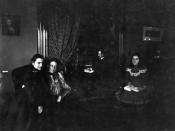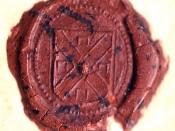Thomas Putnam plays a major role in the Salem witch hunt in Arthur Miller's The Crucible. Inheriting a handsome amount of property makes Putnam a wealthy person; however, it doesn't seem to satisfy his ambition. After the town terribly rejected Putnam's brother-in-law, Bayley, Putnam's bitterness has increased. Finally his prodigious involvement in the relentless accusations places him in the center of the spot light, making him a salient character in both the play and the indignant period of the American history.
Thomas Putnam has a very large part in initiating the Salem witch hunt. He is the first character who blames unnatural causes for the illness among the children. Furthermore, he firmly believes in the existence of "vengeful spirits layin' hands on these children"(15). "There is a murderous witch among us," he vehemently cries out(16). His action isn't surprising because he has lost seven newborns and his Ruth is sick.
He wants to hunt down the witch, but he needs some aid. He lays his eyes on Parris because Parris is the minister and Betty is also ill. Thus, Putnam tries to coerce Parris to witchcraft. "Declare it yourself," Putnam tells Parris, "you have discovered witchcraft"(16). At this point, Putnam captures everyone's attention, and then he strikes.
Thomas Putnam is behind the accusations toward many people. "Did you ever see Sarah Good with him," he questions Tituba, "or Osburn?"(46). With fear and panic, Tituba confesses she sees the Devil with them. Sarah Good and Osburn are insignificant in Salem. They certainly don't satisfy Putnam's fastidious demand, so he moves on to the next victim and eventually accuses Rebecca Nurse. "For murder, she's charged! For the marvelous and supernatural murder of Goody Putnam's babies"(71). Putnam truly stands out of the crowd this time. He is perhaps the only person corrupt enough to accuse Rebecca. Last but not to the least he manipulated his daughter to accuse George Jacobs. Does Putnam simply wants to killed the witches and save the children? No, there is something bigger he is after.
Thomas Putnam profits remarkably in the Salem witch hunt . The person who initiates the event receives all the benefit. Is it a coincident? It is not. Thomas Putnam must have a plan. At the beginning of the play, the argument between Putnam, Giles, and Proctor shows contentions between people over land. "The tract is in my bounds, it's my bounds, Mr. Proctor," says Putnam(32). "I bought that tract from Goody Nurse's husband five month ago," Proctor replies Putnam(32). "He had no right to sell it. It stands clear in my grandfather's will", Putnam tries to show evidence(32). Later in the play, Rebecca Nurse, Giles Corey and John Proctor are prosecuted. To whom will the tract go to? Only Mr. Putnam can afford to buy. George Jacobs is hanged because of Ruth. "If Jacobs hangs for a witch he forfeit up his property-that's law! And there is none but Putnam with the coin to buy so great a piece. This man is killing his neighbor for their land"(96). Putnam is a realistic person. His major plan is to become wealthier and destroy his oppositions in the witch hunt. In the end, Putnam completes his plan successfully.
People like Putnam exists throughout the history of mankind, such as Joseph McCarthy and Adolph Hitler. They profit through abominations toward other people. They fulfill their odious purposes, but the retributions imposed on them are far not adequate comparing to their deeds. What is wrong with mankind? It is "the sense of guilt" and "the sin of public terror" that "divests man of conscience, of himself"(Miller 2). Arthur Miller tries to tell people such philosophies when he sees the replay of history in the 1950s. Mass hysteria, materialism, dishonesty are some of the problems human beings always have. "It underlies every word in The Crucible"(Miller 2). The society has suffered over and over on these issues. People think they learn from the mistakes they have made; however, history in the past leaves a question mark to the future: when will the tragedy happen again?





